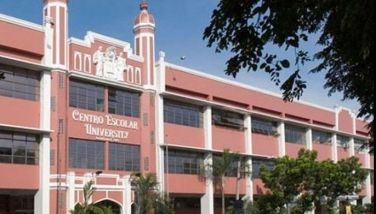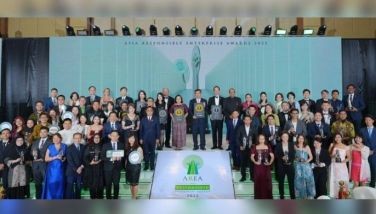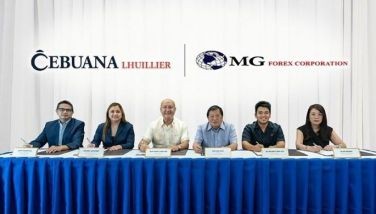The triumph of the ‘heathen Chinee’
June 3, 2004 | 12:00am
MELBOURNE, Australia – It’s quite possible nobody is reading this column, since I’m not writing about the slow canvass in Congress. Nor am I going to dwell on the silly intention of opposition politicians (is it true that among them are Senator Gregorio "Gringo" Honasan and Ilocos Norte Rep. Imee Marcos?) to try to stop the canvass by an appeal to the Supreme Court.
What would halting the canvass prove? That "cheating" in favor of incumbent President GMA can "thus" be prevented? What a disgraceful election exercise this has been which cannot produce an outcome? Let the canvass, so belatedly begun, be completed once and for all. Like England’s notoriously berated King Canute, how can the waves be commanded to roll back?
The "loser", whoever it will be (you know it already, I guess), knows, of course, that to protest later might prove fruitless. But to protest even before the canvass is midway into the official electoral count is even more ridiculous. Somehow, we must all by now realize, we’ve got to change our system. But by what draconian means, on the other, we’ve still got to figure out.
In the meantime, it’s obvious, we’re stuck with what we’ve got – unless somebody’s contemplating revolution, or a Napoleonic brumaire, or some other extreme measure. In which case, the cure would surely be worse than the disease.
In order to calm the waves, like Jesus did in Galilee, our Catholic bishops have just said the elections were "okay". We’ll have to leave it at that and move on. Fortunately, there are a lot more tragedies and scandals to distract the rest of the planet – otherwise, we’d be the laughing stock of the planet.
For example, when we decry our own political dynasties, another dynastic development has come up to disturb the world’s democratic urges. Remember how Singapore’s founding father, the indomitable ex-Prime Minister (now Senior Minister) Lee Kuan Yew, was extolled worldwide as a selfless and incorruptible nation-builder and leader. On the basis of his sterling record as the "creator" of the city-state of Singapore, L.K.Y. went around preaching to all of us in Asia, and castigating our selfish corruption in the Philippines (while we ourselves heartily applauded this verbal flagellation).
Now, the glorious leader’s son, it emerges, will become Singapore’s next-anointed leader. As The Sydney Morning Herald headlined it on page 13: "ALL IN THE FAMILY: LEE’S SON NAMED SINGAPORE’S NEXT PM."
Mark Baker, the Herald’s Singapore correspondent; wrote: "The Lee dynasty has cemented its dominance of Singapore politics for another generation with the endorsement of Lee Kuan Yew’s eldest son as the country’s next prime minister.
"A closed-door meeting of the ruling People’s Action Party’s central executive confirmed that 52-year-old Lee Hsien Loong will succeed Goh Chok Tong, who is expected to retire in August after 13 years in the top job.
"The announcement ratifies a promotion seen as inevitable since Lee Kuan Yew – Singapore’s founding father – relinquished the prime ministership in 1990."
Indeed, at present, Lee Hsien Loong is already Deputy Prime Minister, Finance Minister and Chairman of the Central Bank. His younger brother, as The Sydney Morning Herald reminded us yesterday, is Chief Executive of SingTel, the country’s biggest phone company – which has a major stake, mind you, in one of our own Philippine cellphone biggies. Moreover, Hsien Loong’s wife, Ho Ching, is head of Temasek Holdings, "the secretive corporation through which the (Singapore) Government controls its vast business assets."
Lee Kuan Yew himself, who turns 81 in September, remains the Senior Minister in the Cabinet.
When Lee Hsien Loong was proposed as the next Prime Minister, nobody among the MPs (members of parliament) objected, or nominated any alternative candidates. In fact, Prime Minister Goh had lauded the Lees as "an exceptional family" and testily told the Financial Times last year: "There can be perception, there can be allegations, but it can’t be proven that there was nepotism."
Hello. How can we swallow that bland allegation?
Everybody, naturally, has known for many years that Hsien Loong would succeed Daddy. Goh forgets perhaps that as early as three years ago, he had declared his coming "retirement" and the probable take-over of the Lee heir.
Lee the Younger had, if you’ll recall, been a Brigadier General in the Singapore Armed Forces, but in the old days we journalists used to quip that the initials B.G. before his name stood not for Brigadier General, but for "Baby God". Well, Baby is now about to come into his own.
There was a time, if you’ll also recall, that B.G. was supposed to be dying of cancer. But the cancer seems to have vanished, while the godlike legacy remains. B.G. also had a first wife, a Malaysian lady doctor, if I remember right. She died. Further no affiant can say, since the law firm of Lee & Lee is very diligent in filing libel or slander cases – and Singapore can punish heinous offenders (like it hanged OFW Flor Contemplacion) with several life-threatening strokes of the rotan.
Lee Kuan Yew himself, a brilliant lawyer with a "double first" from Cambridge University, used to be called "Harry Lee" and spoke impeccable Cantab English before he learned putonghwa, or Mandarin Chinese. In truth, he is a Hakka Chinese, belonging to what some haughtier ethnic groups there refer to as their gypsy minority. This is not to demean L.K.Y.’s fantastic achievement of making Singapore a proud nation planting almost every tree in its barren and rocky ground, expanding the city-state by landfill, making the Singapore economy soar.
But truth is truth.
L.K.Y.’s late father, a former radical Leftist but mellowed in his advancing years, was a very good friend of this writer. I used to visit the old man in the jeweler’s shop, Da Silva’s, in Marina square, where he worked. He would wink at me and quip: "Well, here I am. My son is Prime Minister, but I’m still working as a shop clerk." Which is true. To which I would reply: "Yes, but the clerk right behind you looks like a bodyguard."
"Nonsense," he would laugh. Then he’d cast an appreciative eye at a pretty girl passing by. I liked the old man immensely, and his lack of pretense, and his thoroughly jovial nature. I wish that somehow Baby God could have inherited some of his sense of humor – and good-natured self-deprecation. If he did, this would augur well for Singapore.
Otherwise, too bad.
But who are we to cast stones? As the late acerbic Manila Mayor Arsenio H. Lacson would crack: People who live in tin houses shouldn’t throw can openers.
It’s a joy to be back in Melbourne, one of the most urbane and liveable cities in the world. Sydney may hustle with power and progress (as well as dockside roughness), but Melbourne is almost ante-bellum in its genteel appearance, with entrancing parks, "walkabouts", and 19th century Victorian era facades merging with modern skyscrapers.
The truth is that this metropolis of 3.5 million is a multi-cultural society, boasting more than 3,000 restaurants and cafés, representing every type of cuisine from native Aussie to European (especially Italian on Lygon street), to Asian, American, and African. As the guidebook will tell you, surprisingly Melbourne is also home to one of the largest Greek-speaking populations in the world. Which is one of the reasons why, in Australia, they’re making a big thing about the rekindling of the Olympics Flame, presaging the coming Olympics in Athens, the Greek homeland of Marathon, etc.
Just as happened when the Olympics were held in Sydney in 2000, after the "torch relay" from Greece arrives in Sydney on Friday morning (at the start of a unique global odyssey embracing 33 cities, 26 countries, six continents and 37 time zones), Olympian Kieren Perkins will carry the torch atop the Harbour Bridge this Friday, then it will move to Melbourne to be held aloft by former Olympic swimmer and television commentator Nicole Livingstone – who’ll then pass it on to be jetted out to Tokyo for the remainder of its journey.
When you walk the streets of Melbourne today, however (it’s a chilly 11 degrees Celsius here), you’ll find fewer Greek-Australians than – you said it – Chinese. From Collins, to Flinders, to the Bourke Street Mall, the pedestrians, window-shoppers, executives and office workers (even the pharmacist at the nearby chemists shop) are either Chinese-Australians or Chinese tourists.
We flew in from Adelaide yesterday afternoon – our Qantas flight delayed three hours by torrential rain in South Australia’s capital – to check into the superb Grand Hyatt on Collins street, ushered into a marvelous 24th floor suite accompanied by a welcome greeting from its general manager, Michel Koopman. The room boy who came to tidy up the room was named Jerry Jia. When I asked him where he was from, he replied he had come from Hangzhou, and was studying for his Master’s degree in business at the University of Melbourne. "What a coincidence," I exclaimed. "I was in Hangzhou only a week ago," I told him.
When I said that I had stayed in the Radisson Plaza hotel there, rather than in the Shangri-La which was on romantic West Lake, a haven for honeymooners, the young man chuckled: "The Radisson is in the heart of town – just behind McDonald’s, Starbucks and Haagen-Dazs." (Hangzhou or Hangchow is about 170 kilometers from Shanghai – famous for having once been a royal capital, as well as for its silk and for growing the best tea in China.)
The irony of there being so many Chinese now living or studying in Melbourne is that in 1854, when thousands were arriving daily "at docks overflowing with luggage, building materials and crates of imported products" to form the nucleus of the new community, the angry word everywhere was "Chinese keep out!"
What gave Melbourne its impetus as a new settlement had been the Gold Rush. In 1851, the cry went out that that gold had been found near Melbourne – one of the places where the precious metal had been struck was Ballarat (which we visited se-veral years ago).
Immediately, gold-seeking thousands poured into the area from all over the world. Accommodation was scarce and too-expensive, as a result of which makeshift houses or iron, canvas, and timber mushroomed in the city’s edge. The small port town was transformed into a mecca for the anxious and ambitious.
By 1984, some 86 percent of those who inhabited the budding state of Victoria had arrived only in the previous three years! Most of the "immigrants" had come from England, Scotland, Ireland, Wales, America and Germany. The trouble is that many Chinese also arrived to try their luck in the gold fields. The newly-arrived Chinese were subjected to intense harassment by the white miners – and there were even riots on the Melbourne docks to prevent more Chinese from landing. This was, it’s said, the start of the "White Australia" policy.
The "white" Aussies and immigrants vowed to stop "the yellow peril" and expel "the heathen Chinese".
The tumultuous year 1854 was also the year of the battle of the Eureka Stockade in Ballarat where a group of angry miners rebelled against the exploitation by corrupt officials of "miners’ licenses" to work in the gold fields. In the armed confrontation (the only domestic "war" experienced in Australia) thirty miners died – but the despised "license" requirement was abolished.
As for the Chinese, they’re not only back, they’re here in great numbers, In fact, when you stroll Melbourne’s streets, there are so many Chinese, Vietnamese, Koreans, Indians, Pakistanis, and, indeed, quite a number of Filipinos, that you get the feeling that not only geographically, but in growing reality, Australia is becoming genuinely a continent "in Asia".
This should not alarm the likes of Paulynn Hansen, whose radically racist party has largely been rejected, but reinforce the idea that Donald Horne was, in his own sarcastic but infectious manner, so correct in dubbing Oz, "The Lucky Country". Ready for the 22nd century, not just the 21st.
However, the Australians voted some years ago to retain the Monarchy and reject becoming a Republic. Who can blame them? When a referendum was taken, the pro-Queen monarchists sneered: "Do you want to become a Republic? Just look at the Philippines!"
The voters went to the polls after that argument, and voted against converting into a Republic.
What about us?
What would halting the canvass prove? That "cheating" in favor of incumbent President GMA can "thus" be prevented? What a disgraceful election exercise this has been which cannot produce an outcome? Let the canvass, so belatedly begun, be completed once and for all. Like England’s notoriously berated King Canute, how can the waves be commanded to roll back?
The "loser", whoever it will be (you know it already, I guess), knows, of course, that to protest later might prove fruitless. But to protest even before the canvass is midway into the official electoral count is even more ridiculous. Somehow, we must all by now realize, we’ve got to change our system. But by what draconian means, on the other, we’ve still got to figure out.
In the meantime, it’s obvious, we’re stuck with what we’ve got – unless somebody’s contemplating revolution, or a Napoleonic brumaire, or some other extreme measure. In which case, the cure would surely be worse than the disease.
In order to calm the waves, like Jesus did in Galilee, our Catholic bishops have just said the elections were "okay". We’ll have to leave it at that and move on. Fortunately, there are a lot more tragedies and scandals to distract the rest of the planet – otherwise, we’d be the laughing stock of the planet.
Now, the glorious leader’s son, it emerges, will become Singapore’s next-anointed leader. As The Sydney Morning Herald headlined it on page 13: "ALL IN THE FAMILY: LEE’S SON NAMED SINGAPORE’S NEXT PM."
Mark Baker, the Herald’s Singapore correspondent; wrote: "The Lee dynasty has cemented its dominance of Singapore politics for another generation with the endorsement of Lee Kuan Yew’s eldest son as the country’s next prime minister.
"A closed-door meeting of the ruling People’s Action Party’s central executive confirmed that 52-year-old Lee Hsien Loong will succeed Goh Chok Tong, who is expected to retire in August after 13 years in the top job.
"The announcement ratifies a promotion seen as inevitable since Lee Kuan Yew – Singapore’s founding father – relinquished the prime ministership in 1990."
Indeed, at present, Lee Hsien Loong is already Deputy Prime Minister, Finance Minister and Chairman of the Central Bank. His younger brother, as The Sydney Morning Herald reminded us yesterday, is Chief Executive of SingTel, the country’s biggest phone company – which has a major stake, mind you, in one of our own Philippine cellphone biggies. Moreover, Hsien Loong’s wife, Ho Ching, is head of Temasek Holdings, "the secretive corporation through which the (Singapore) Government controls its vast business assets."
Lee Kuan Yew himself, who turns 81 in September, remains the Senior Minister in the Cabinet.
When Lee Hsien Loong was proposed as the next Prime Minister, nobody among the MPs (members of parliament) objected, or nominated any alternative candidates. In fact, Prime Minister Goh had lauded the Lees as "an exceptional family" and testily told the Financial Times last year: "There can be perception, there can be allegations, but it can’t be proven that there was nepotism."
Hello. How can we swallow that bland allegation?
Everybody, naturally, has known for many years that Hsien Loong would succeed Daddy. Goh forgets perhaps that as early as three years ago, he had declared his coming "retirement" and the probable take-over of the Lee heir.
Lee the Younger had, if you’ll recall, been a Brigadier General in the Singapore Armed Forces, but in the old days we journalists used to quip that the initials B.G. before his name stood not for Brigadier General, but for "Baby God". Well, Baby is now about to come into his own.
There was a time, if you’ll also recall, that B.G. was supposed to be dying of cancer. But the cancer seems to have vanished, while the godlike legacy remains. B.G. also had a first wife, a Malaysian lady doctor, if I remember right. She died. Further no affiant can say, since the law firm of Lee & Lee is very diligent in filing libel or slander cases – and Singapore can punish heinous offenders (like it hanged OFW Flor Contemplacion) with several life-threatening strokes of the rotan.
Lee Kuan Yew himself, a brilliant lawyer with a "double first" from Cambridge University, used to be called "Harry Lee" and spoke impeccable Cantab English before he learned putonghwa, or Mandarin Chinese. In truth, he is a Hakka Chinese, belonging to what some haughtier ethnic groups there refer to as their gypsy minority. This is not to demean L.K.Y.’s fantastic achievement of making Singapore a proud nation planting almost every tree in its barren and rocky ground, expanding the city-state by landfill, making the Singapore economy soar.
But truth is truth.
L.K.Y.’s late father, a former radical Leftist but mellowed in his advancing years, was a very good friend of this writer. I used to visit the old man in the jeweler’s shop, Da Silva’s, in Marina square, where he worked. He would wink at me and quip: "Well, here I am. My son is Prime Minister, but I’m still working as a shop clerk." Which is true. To which I would reply: "Yes, but the clerk right behind you looks like a bodyguard."
"Nonsense," he would laugh. Then he’d cast an appreciative eye at a pretty girl passing by. I liked the old man immensely, and his lack of pretense, and his thoroughly jovial nature. I wish that somehow Baby God could have inherited some of his sense of humor – and good-natured self-deprecation. If he did, this would augur well for Singapore.
Otherwise, too bad.
But who are we to cast stones? As the late acerbic Manila Mayor Arsenio H. Lacson would crack: People who live in tin houses shouldn’t throw can openers.
The truth is that this metropolis of 3.5 million is a multi-cultural society, boasting more than 3,000 restaurants and cafés, representing every type of cuisine from native Aussie to European (especially Italian on Lygon street), to Asian, American, and African. As the guidebook will tell you, surprisingly Melbourne is also home to one of the largest Greek-speaking populations in the world. Which is one of the reasons why, in Australia, they’re making a big thing about the rekindling of the Olympics Flame, presaging the coming Olympics in Athens, the Greek homeland of Marathon, etc.
Just as happened when the Olympics were held in Sydney in 2000, after the "torch relay" from Greece arrives in Sydney on Friday morning (at the start of a unique global odyssey embracing 33 cities, 26 countries, six continents and 37 time zones), Olympian Kieren Perkins will carry the torch atop the Harbour Bridge this Friday, then it will move to Melbourne to be held aloft by former Olympic swimmer and television commentator Nicole Livingstone – who’ll then pass it on to be jetted out to Tokyo for the remainder of its journey.
When you walk the streets of Melbourne today, however (it’s a chilly 11 degrees Celsius here), you’ll find fewer Greek-Australians than – you said it – Chinese. From Collins, to Flinders, to the Bourke Street Mall, the pedestrians, window-shoppers, executives and office workers (even the pharmacist at the nearby chemists shop) are either Chinese-Australians or Chinese tourists.
We flew in from Adelaide yesterday afternoon – our Qantas flight delayed three hours by torrential rain in South Australia’s capital – to check into the superb Grand Hyatt on Collins street, ushered into a marvelous 24th floor suite accompanied by a welcome greeting from its general manager, Michel Koopman. The room boy who came to tidy up the room was named Jerry Jia. When I asked him where he was from, he replied he had come from Hangzhou, and was studying for his Master’s degree in business at the University of Melbourne. "What a coincidence," I exclaimed. "I was in Hangzhou only a week ago," I told him.
When I said that I had stayed in the Radisson Plaza hotel there, rather than in the Shangri-La which was on romantic West Lake, a haven for honeymooners, the young man chuckled: "The Radisson is in the heart of town – just behind McDonald’s, Starbucks and Haagen-Dazs." (Hangzhou or Hangchow is about 170 kilometers from Shanghai – famous for having once been a royal capital, as well as for its silk and for growing the best tea in China.)
The irony of there being so many Chinese now living or studying in Melbourne is that in 1854, when thousands were arriving daily "at docks overflowing with luggage, building materials and crates of imported products" to form the nucleus of the new community, the angry word everywhere was "Chinese keep out!"
What gave Melbourne its impetus as a new settlement had been the Gold Rush. In 1851, the cry went out that that gold had been found near Melbourne – one of the places where the precious metal had been struck was Ballarat (which we visited se-veral years ago).
Immediately, gold-seeking thousands poured into the area from all over the world. Accommodation was scarce and too-expensive, as a result of which makeshift houses or iron, canvas, and timber mushroomed in the city’s edge. The small port town was transformed into a mecca for the anxious and ambitious.
By 1984, some 86 percent of those who inhabited the budding state of Victoria had arrived only in the previous three years! Most of the "immigrants" had come from England, Scotland, Ireland, Wales, America and Germany. The trouble is that many Chinese also arrived to try their luck in the gold fields. The newly-arrived Chinese were subjected to intense harassment by the white miners – and there were even riots on the Melbourne docks to prevent more Chinese from landing. This was, it’s said, the start of the "White Australia" policy.
The "white" Aussies and immigrants vowed to stop "the yellow peril" and expel "the heathen Chinese".
The tumultuous year 1854 was also the year of the battle of the Eureka Stockade in Ballarat where a group of angry miners rebelled against the exploitation by corrupt officials of "miners’ licenses" to work in the gold fields. In the armed confrontation (the only domestic "war" experienced in Australia) thirty miners died – but the despised "license" requirement was abolished.
As for the Chinese, they’re not only back, they’re here in great numbers, In fact, when you stroll Melbourne’s streets, there are so many Chinese, Vietnamese, Koreans, Indians, Pakistanis, and, indeed, quite a number of Filipinos, that you get the feeling that not only geographically, but in growing reality, Australia is becoming genuinely a continent "in Asia".
This should not alarm the likes of Paulynn Hansen, whose radically racist party has largely been rejected, but reinforce the idea that Donald Horne was, in his own sarcastic but infectious manner, so correct in dubbing Oz, "The Lucky Country". Ready for the 22nd century, not just the 21st.
However, the Australians voted some years ago to retain the Monarchy and reject becoming a Republic. Who can blame them? When a referendum was taken, the pro-Queen monarchists sneered: "Do you want to become a Republic? Just look at the Philippines!"
The voters went to the polls after that argument, and voted against converting into a Republic.
What about us?
BrandSpace Articles
<
>
- Latest
- Trending
Trending
Latest
Trending
Latest

By POINT OF VIEW | By Francisco Tiu Laurel Jr. | 1 day ago

By VIRTUAL REALITY | By Tony Lopez | 1 day ago
Recommended

























